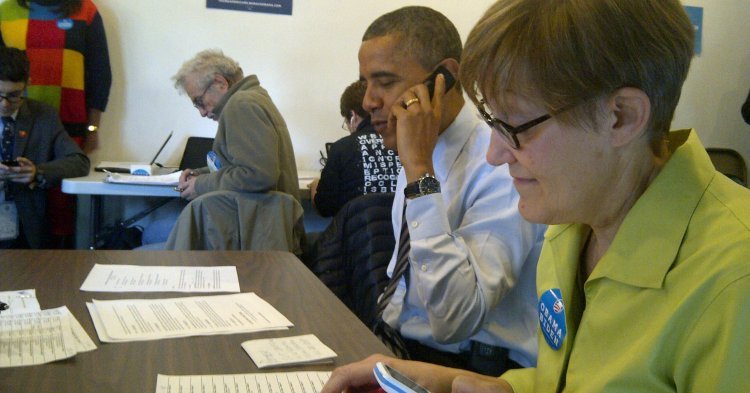We live in an era of ‘market-oriented’ political parties, where voters are viewed as customers. In this context, many researchers believe that electoral databases are essential in the development and efficient use of methods such as polling, focus groups and market testing. Parties need to position themselves according to the electorate’s needs and to target the electorate. Since the goal of political campaigning is to maximize the chances to win, an accurate analysis of the data about voters’ preferences is necessary because it reveals true unobserved characteristics about citizens.
Using databases is a part of the current professionalisation of political campaigning. The USA, especially with the 2008 and 2012 Obama campaigns, was the first country to experiment professional political campaigns and voter databases, inspiring other countries. According to Timothy Prescott, data analysis team member in the Obama campaigns, big data means accuracy: parties can be more efficient, more successful, eliminate errors and save money.
But what does it mean for democracy?
Low turnout and swing voters
In Western countries we live in an era of declining ideology, lower voter turnouts and increasing volatility of the electorate, as well as growing number of late deciders who make up their minds during the last 72 hours of the campaign. In response to that, political databases and targeting can make the communication more relevant for the recipient. This aspect can be very good for democracy and benefit voters, because it can spark enthusiasm, boost participation and eventually increase wider support on the part of the citizens for parties and the Government elected.
Moreover, targeting swing voters can save resources because it enables one to avoid trying to persuade those who do not have the intention to change their opinion. In this regard, a better management of public money is clearly good for democracy. This is even a stronger need now that expenditures for campaigns are rising and political marketing is a growing business.
A party would now be able to target swing voters through door-knocking – or other techniques such as letters or social media ads – on the basis of the issues that are more interesting to those voters and with prepared arguments. For example, it is possible to address issues on youth to the youngsters and seniors’ concerns to seniors and so on. This is all the more important nowadays, when people live fast-paced lives and have limited time to gather information.
Is there a risk of manipulation?
The use of databases has raised concerns on the state of representative democracy. One danger is that they could increase the power of the rulers over the ruled and mark the ascendance of a cartelised party system, because a leading party candidate has more information and more resources than the opposition. On the other hand, however, small parties can also benefit from targeting. The example of the recent American presidential elections shows that the opposition can still win, like Trump did, even with fewer resources than Hillary Clinton.
On the other hand, some fear that targeting swinging voters will skew public policy towards the wishes of a tiny minority of the electorate, at the expense of the majority.
The answer lies in the view of what representative democracy is and in the trust in the ability of the electorate to decide. Some authors like Jennifer Lees-Marshment also warn that the effects of these techniques should not be overestimated and that external factors, like the media, can still be influential as campaign channels. However, for example, the support of large media outlets was not enough for Hillary Clinton to win the recent American election. Therefore, some researchers are questioning the influence of traditional media, because the new media offer different sources of information for the public. At the same time, one big risk lies in ‘auto-generated’ filters, like the filter bubble on social media. More research needs to be done on this topic.
The takeaway point is that new technologies will still not guarantee the result (an automatic win) because they will only help campaigns that are already well off with strong content and leaders, but they allow improvements in political campaigns. For instance, volunteers still need to convince voters, but now they are better at using messages more likely to resonate with persuadable neighbours. This leads to higher-quality interaction between campaigners and citizens, as well as to a more enjoyable experience for the volunteers. Positive results can be a greater pluralism for marginalised groups and for people who are not normally interested in politics, and less political cynicism.
Defending privacy
New opportunities come with new risks and responsibilities. In fact, databases can collect highly sensitive information on voters. The information collected can include the voter’s name, address, phone number, voting patterns, political donations, estimated income, race, family members, and even magazine subscriptions. There can be a danger of misuse of that data in the vein of ‘Big Brother’ and if a state turns into a dictatorship, this can even be terrifying. Even without such extremes, it is bad when there is little scrutiny of databases. According to authors such as Peter van Onselen and Wayne Errington, major political parties have no interest in public scrutiny because people would be upset at monitoring and change their behavior, which is clearly not good for a party who wants to program its targets. Privacy is a value very close to people. However, there are ways to secure more privacy while still using data: for example, according to Colin Bennett, in Europe data protection rules offer voters stronger protection than in the USA and Canada.
Taking an extremely defensive position against databases because “they endanger democracy” as a whole is not the right way forward. We should rather find solutions: public consciousness of such databases and parties’ public scrutiny, an attentive legislation to prevent collection of data without informed consent, mandatory ethical training for parties’ staff members. People should also be able to edit or delete their information afterwards. All of this should be included in a clear legal framework, based on transparency and accountability, and with the establishment of independent authorities as monitors. Such an approach could also create a positive pressure for the development of European data protection laws.
Contribution to democracy, but with some warnings
In conclusion, databases and electorate targeting are an interesting opportunity and can have a positive impact on the state of democracy. Better communication with the electorate, more participation, a better managing of the money: all of this is good for democracy. The problems of privacy and manipulation exist, but there are solutions offered by a clear legal framework and public information. Instead of not using them tout court, it is better to learn how to regulate them and make the process transparent. These techniques are not the only secret to electoral success, so the game of democracy is still open. Only, now it has a new tool to explore.
References
Brader, T. (2005). Striking a responsive chord: How political ads motivate and persuade voters by appealing to emotions. American Journal of Political Science, 49(2), 388-405.
Lees-Marshment, J. (2001). The marriage of politics and marketing. Political Studies, 49, 692-713. Blaemire (2003).
Moorman, M. , & Neijens, P. C. (2012). Political advertising. In S. L. Rodgers, & E. L. Thorson (Eds.). Advertising Theory (pp. 297-309). Routledge.
Reeves, P., De Chernatony, L., Carrigan, M. (2006). Building a political brand: Ideology or voter driven strategy. Brand Management, 13(6), 418-428.
Bennett, Colin J, (2016). Voter databases, micro-targeting, and data protection law: can political parties campaign in Europe as they do in North America?. International Data Privacy Law, Vol. 6, No. 4
Cacciotto M. (2016): Is Political Consulting Going Digital?, Journal of Political Marketing, 1-30
Di Fatta G., Read J., Jaworska S., Nanda A., (2015), Big Social Data and Political Sentiment: the Tweet Stream during the UK General Election 2015 Campaign, 2015 IEEE International Conference on Smart City/SocialCom/SustainCom
Henneberg, S. C. (2008) An Epistemological Perspective on Research in Political Marketing, Journal of Political Marketing, 7:2, 151-182,
Mair, P. and Katz, S. (1997) ‘Party Organisation, Party Democracy, and the Emergence of the Cartel Party.’ In Party System Change, ed. P. Mair. Oxford: Clarendon Press.
Nickerson D. W. and Rogers T., (2014). Political Campaigns and Big Data. Journal of Economic Perspectives—Volume 28, Number 2—Pages 51–74
Russmann U. (2016): Voter Targeting Online in Comparative Perspectives: Political Party Websites in the 2008/2009 and 2013 Austrian and German Election Campaigns, Journal of Political Marketing, 1-24.
Serazio, M. (2014). The New Media Designs of Political Consultants: Campaign Production in a Fragmented Era. Journal of Communication, Vol.64(4), pp.743-763
van Onselen, P. & Errington, W. (2004). Electoral databases: big brother or democracy unbound?, Australian Journal of Political Science, 39:2, 349-366.
Sparrow, N. and Turner, J., (2001),“The permanent campaign - The integration of market research techniques in developing strategies in a more uncertain political climate”, European Journal of Marketing, Vol. 35 Iss 9/10 pp. 984 - 1002
Steger W. P., Kelly S. Q & Wrighton J. M.(2006) Campaigns and Political Marketing in Political Science Context, Journal of Political Marketing, 5:1-2, 1-10


Follow the comments: |
|
